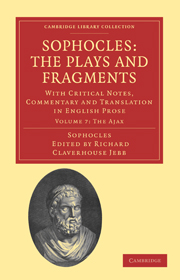APPENDIX
Published online by Cambridge University Press: 07 September 2011
Summary
15 κἂν ἃποπτος ἦς ὅμως. In his Lehrbuch der griechischen Bühnen alterthümer, p. 151, note 1, Dr Albert Müller holds that this clause is to be understood as merely a general remark (‘als allgemeine Bemerkung zu fassen ist’). He supposes that Athena appears, not in the air (on the θεολογεῖον), but on the λογεῖον itself, and is visible from the first to Odysseus. It is true that Greek Tragedy furnishes several instances in which a deity, who opens the first scene, must be conceived as appearing on the λογεῖον,–or let us say (since there are those who deny the existence of a stage), on the place from which the actors ordinarily spoke. This is the case with Apollo in the Alcestis; Hermes in the Ion; Dionysus in the Bacchae; Poseidon and Athena in the Troades; and possibly Aphroditè in the Hippolytus (though this last is an instance in which the θεολογεῖον may well have been used). But here it is surely inconceivable that, if Odysseus saw Athena standing near him, he should say to her, ‘How clearly I hear thy voice, even when thou art unseen.’ Such ‘a general remark’ would be too weak.
17 κώδωνος ὡς Τυρσηνικῆς. The scholiast on Iliad 18. 219 enumerates six kinds of trumpets,–the first being ἡ Ἑλληνική, μακρὰ τὸ σχῆμα, ἥν Τυρρηνοῖς εὗρεν ἡ ᾈθηνᾷ,–which is the kind meant in this verse.
- Type
- Chapter
- Information
- Sophocles: The Plays and FragmentsWith Critical Notes, Commentary and Translation in English Prose, pp. 213 - 240Publisher: Cambridge University PressPrint publication year: 2010First published in: 1896



